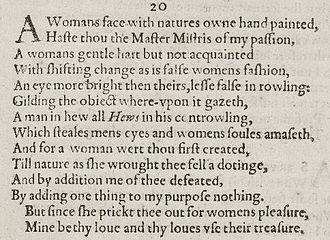| Sonnet 20 | |||||||
|---|---|---|---|---|---|---|---|
 Sonnet 20 in the 1609 Quarto | |||||||
| |||||||
Sonnet 20 is one of the best-known of 154 sonnets written by the English playwright and poet William Shakespeare. Part of the Fair Youth sequence (which comprises sonnets 1-126), the subject of the sonnet is widely interpreted as being male, thereby raising questions about the sexuality of its author. In this sonnet (as in, for example, Sonnet 53) the beloved's beauty is compared to both a man's and a woman's.
- ^ Pooler, C[harles] Knox, ed. (1918). The Works of Shakespeare: Sonnets. The Arden Shakespeare [1st series]. London: Methuen & Company. OCLC 4770201.